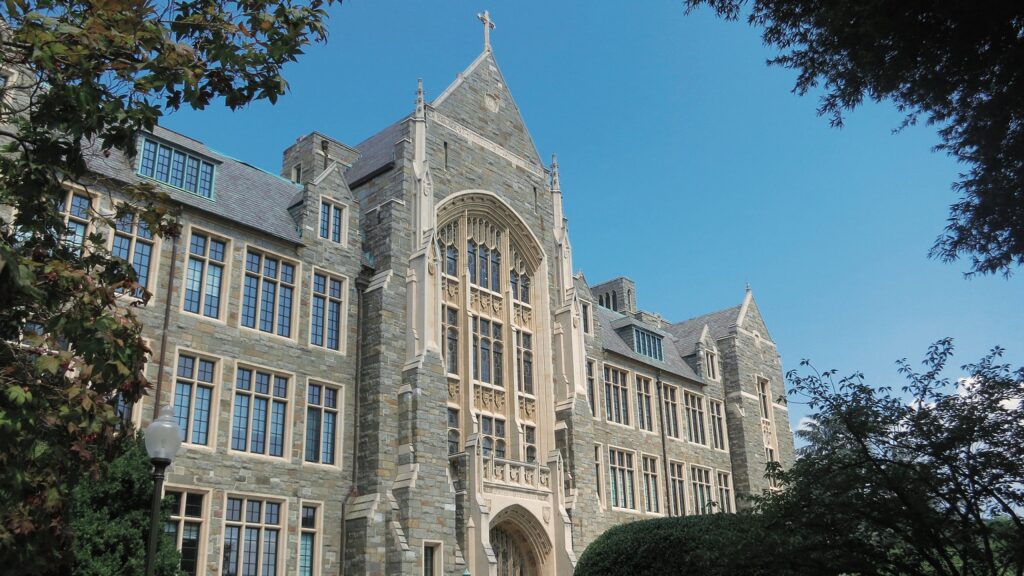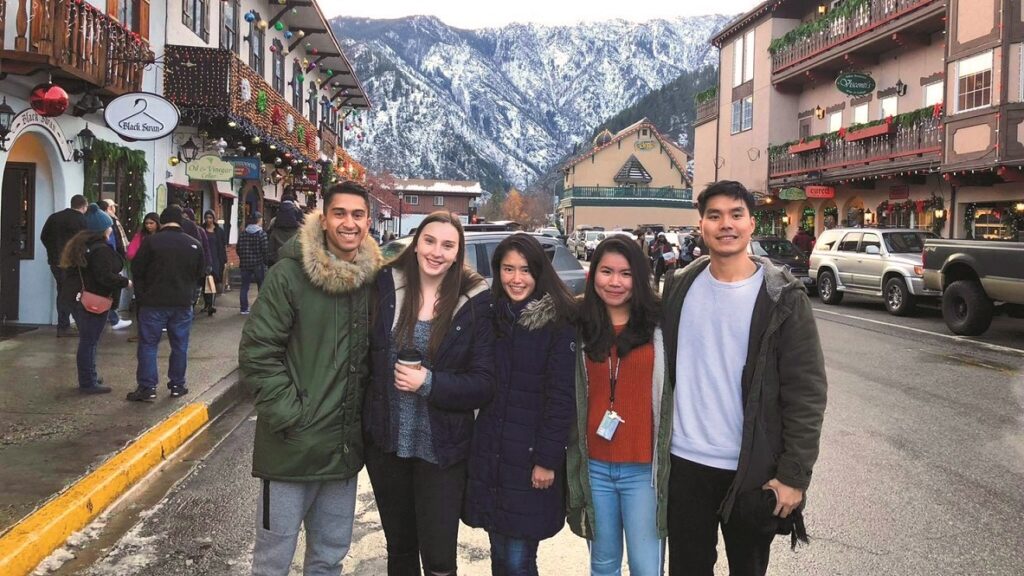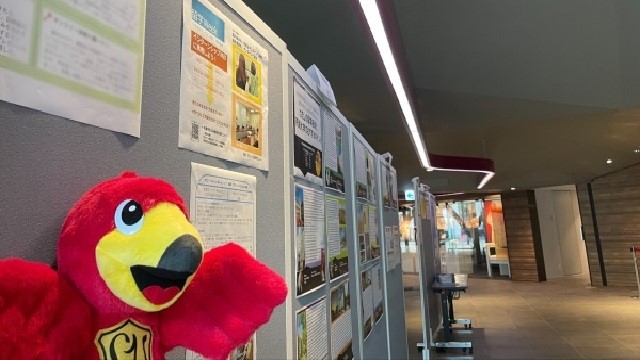Learning Abroad
There are several means of learning abroad during your studies and after graduation through the Sophia University system. There are various programs that differ in terms of duration, transferrable credits, and cost. The main categories are long-term study abroad for one or more semesters, short-term study abroad during summer or spring vacation, internships abroad, and admission to graduate schools abroad. Regardless of your faculty affiliation, you can join a program that is right for you.


-1.jpg)
Long-term Study Abroad
Study at an overseas university or educational institution for at least one semester. Exchange program, general study abroad, and study abroad on a leave of absence are available.
- Exchange Program
-
The exchange program is a system for Sophia University and an overseas university with which Sophia University has an exchange agreement to mutually send and receive students for one year or one semester (six months). With more than 300 exchange partners in about 80 countries around the world, more than 350 students study abroad each year as exchange students, and more than 500 exchange students are accepted from overseas partner institutions.
There is an internal selection process for studying abroad as an exchange student. There are enough slots available for students who meet certain conditions, so a wide range of opportunities are available to students who want to study abroad. Under the tuition transfer system, students are exempted from paying tuition fees at their study abroad destination. This allows students to study in countries with high tuition fees, and they only have to cover mainly the costs of travel, accommodation, and educational materials. There is also a system for recognizing the credits earned in study abroad programs, making it possible for students to graduate in four years.
There are various types of exchange programs, including the Sophia AIMS (SAIMS) program, LAP (Sophia-Nanzan Latin America Program), and graduate school-only exchange programs, in addition to regular exchange programs.
- General Study Abroad
Students are free to choose a degree-granting university and study at their own expense. The procedure is done individually, and tuition fees are paid to both Sophia University and the host university. However, students who study abroad for one semester or more may apply for the Overseas Study Incentive Scholarship. Credits can be recognized and students may also study abroad on a quarter (1/2 semester) basis.
- Study Abroad on a Leave of Absence
Students may take a leave of absence from Sophia University to study abroad. Graduation is postponed for the period of the leave of absence, but students are free to choose the destination and form of study. There is also a reduced tuition fee system for the period of absence, and it is possible to study abroad on a quarter (1/2 semester) basis.
For information on long-term study abroad programs for current students, please see Web Piloti
Short-term Study Abroad
Students study in various parts of the world during summer and spring breaks and other long vacations. Various training sites are available.
- Short-term Language Courses Abroad
As part of their foreign language education, students can participate in language programs sponsored by Sophia University’s exchange partner schools and other institutions, to improve their language skills. Participants are expected to participate in the language program during the summer or spring vacation after adequate preparation based on the prescribed advance instructions at Sophia University. This program is suitable for students who want to improve their language skills intensively during long vacations and is easy to participate in even if you have no overseas experience. Participants are required to take proactive actions to join such programs.
- Short-term Training Abroad
Students participate in short-term programs at Sophia University’s exchange partner institutions and study specialized subjects in a foreign language. A certain level of language proficiency is required to participate in this program, and it is suitable for students who wish to use their own language skills while intensively studying specialized subjects during summer and spring vacations.
- Practical Programs
These programs include study tours and volunteer programs that allow students to deepen their understanding of each theme and region through preliminary lectures on campus, and to learn practical skills in the field.
please see the “Short-term Language Courses Abroad” page, “Short-term Training Abroad” page, and “Practical Programs” page on Web Piloti
Internship Abroad (Internship Course)
Students can earn credits by attending lectures and submitting assignments before and after their work experience at companies, international organizations, and groups with which Sophia University has an agreement. Through their work experience, students will have the opportunity to gain insight into how to apply the specialized knowledge and skills they learned at university in a global society, or what they need to learn for the rest of their university life. Practical training is mainly conducted in Japan, but some of the training may be conducted overseas.
For information on internship courses for current students, please see Web Piloti.
Entering a Graduate School Abroad
Special Programs for Overseas Graduate Schools
Sophia University has a special admission system to affiliated overseas graduate schools. By applying based on recommendations, students can receive preferential treatment, such as priority screening over general applicants and partial tuition reductions or exemptions.
Specials Programs for Overseas Graduate Schools: Introduction of Partner Schools
- Georgetown University Graduate School
Georgetown University is a prestigious private university founded by the Jesuits in 1789, and is located in Washington, DC, USA. This partner institution has a long history of cooperation with Sophia University.
- Columbia University TC
Founded in 1887 in New York, the Columbia University Teachers College (TC) is an independent graduate school of Columbia University and one of the top graduate schools of education in the United States.
- Columbia University SPS
Columbia University School of Professional Studies (SPS) was established in 1995, and is the newest graduate school at Columbia University.
- Fordham University Graduate School
Fordham University is a comprehensive university established by the Jesuits in New York in 1841. It is one of the most highly regarded and predominant universities in the United States.
- Boston College Graduate School
Boston College is a private, comprehensive university founded by the Jesuits in 1863 and is located in Boston, USA. Our partner, the Lynch School of Education and Human Development, is a top graduate school in the field of education.
Please refer to Web Piloti for information on special programs for overseas graduate schools for current students.
3+2 Program with a Graduate Institute in Geneva, Switzerland

The 3+2 Program is a five-year program that consists of three years of undergraduate study at Sophia University and two years of graduate study at the Graduate Institute of International and Development Studies in Geneva, Switzerland. After the end of the program, students earn a bachelor’s degree from Sophia University and a master’s degree from the Graduate Institute of International and Development Studies.
During the first year at the Graduate Institute of International and Development Studies, students study abroad as exchange students from Sophia University and are awarded a bachelor’s degree from Sophia University upon the completion of courses taken during their study abroad, which are approved by Sophia University, and fulfillment of graduation requirements. The Graduate Institute of International and Development Studies offers a two-year program, including one year of undergraduate exchange, to earn the credits required for graduation and a master’s degree.
For more information for current students, please visit Web Piloti
Study Abroad Information
Study Abroad Expenses and Scholarships
Exchange students are not required to pay tuition fees to the host university. However, students may be responsible for other expenses, such as insurance specified by the host university. For general study abroad and study abroad on leave of absence, students are required to pay tuition fees to both Sophia University and the host university. Travel and living expenses during their study abroad are to be borne by the student. For example, if the student studies abroad for one year, he/she can expect to spend 1.5 to 3 million yen for necessary expenses, such as travel and living expenses, depending on the destination. The scholarships available vary depending on the type of study abroad program, but there are scholarships from the Japan Student Services Organization (JASSO) and a wide variety of on-campus scholarships from Sophia University.
Study Abroad Counseling
The university offers a study abroad counseling service for current students who are interested in studying abroad but do not know where to start, or who have concerns about their study abroad plans. Professional counselors are available to answer your questions and concerns.
Study Abroad Fair

Every year around June or July, we hold a Study Abroad Fair, an event to introduce Sophia University’s wide range of study abroad programs to current students. There are various sessions related to studying abroad, such as general information sessions and round-table discussions with seniors who have studied abroad, to help you obtain information and prepare for your study abroad experience.
Examples of program utilization from enrollment to graduation
(For students studying abroad from the fall semester of their junior year)
- 1st year April
- Gather information by participating in study abroad guidance and counseling sessions (available anytime during the school year).
- Apply for and participate in an overseas short-term language course guidance.
- Take part in international exchange activities on campus through Global Network (GL-Net), a volunteer organization that plans and implements international exchange programs between international and Japanese students, and other programs.
- 1st year May September
- Participate in short-term language courses abroad during summer vacation and become more motivated to study abroad for a longer period of time.
- Take the TOEFL iBT® in preparation for a long-term study abroad.
- Gather further information by attending study abroad fairs and other events.
- Utilize the Language Learning Commons (LLC) and English Language Learning Advisors.
- 2nd year September November
- Meet the language and academic requirements of the university of your choice.
- Apply for on-campus selection for exchange students and do the interview.
- 2nd year December 3rd year July
- Determine your study abroad destination and complete the application process.
- Participate in pre-departure orientation and safety management guidance.
- Apply for your visa and make travel preparations.
- 3rd year August 4th year June
Departure from study abroad Returning home
- After the Study Abroad
- Look for jobs while utilizing your study abroad experience, or apply to programs for overseas graduate schools.
- Take part in international exchange activities such as Exchange Student Supporter (a volunteer program to support exchange students who have come to Japan).
- Maintain your language skills after returning from your study abroad.
- After Graduation
- Advance to graduate school through the special programs for overseas graduate schools.
For detailed study abroad information for current students, please visit Web Piloti.